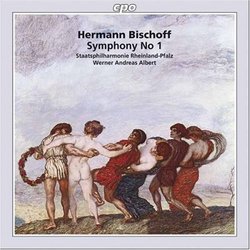| All Artists: Hermann Bischoff, Werner Andreas Albert, Rheinland-Pfalz Staatsphilharmonie Title: Hermann Bischoff: Symphony No. 1 Members Wishing: 0 Total Copies: 0 Label: Cpo Records Original Release Date: 1/1/2006 Re-Release Date: 10/31/2006 Genre: Classical Style: Symphonies Number of Discs: 1 SwapaCD Credits: 1 UPC: 761203711123 |
Search - Hermann Bischoff, Werner Andreas Albert, Rheinland-Pfalz Staatsphilharmonie :: Hermann Bischoff: Symphony No. 1
 | Hermann Bischoff, Werner Andreas Albert, Rheinland-Pfalz Staatsphilharmonie Hermann Bischoff: Symphony No. 1 Genre: Classical
|
Larger Image |
CD Details |
CD ReviewsA Symphony by a Richard Strauss Acolyte J Scott Morrison | Middlebury VT, USA | 11/22/2006 (4 out of 5 stars) "Never heard of Hermann Bischoff (1868-1936)? Well, neither had I. He was a student of Richard Strauss's although only four years younger. He also studied with Ludwig Thuille, another dominant figure in Munich musical life of the era. And he was a colleague of Ernst Boehe whose two volumes of music also recorded on cpo I was not particularly impressed by. But Bischoff is a more talented composer than Boehe and this shows in his First Symphony, an hour-long feast of Straussian orchestration and, in the first movement at least, of Straussian melodic counterpoint. That twenty-minute first movement is a humdinger, even though the galumphing rhythms do tend to make the music sound just the least bit trivial. (I kept thinking of Till Eulenspiegel because of its Bavarian good humor.) The second movement, sehr ruhig und getragen, is a quarter-hour island of melody and quietude that comes before a naively clomping, almost Brucknerian, scherzo. The Allegro moderato finale alternates between good humor and radiant musing.
The symphony as a whole does not really hold up formally, but each of the movements on its own has something interesting or moving to say. Indeed, Bischoff was not sure himself that he had composed a symphony, but rather wondered if it was a collection of four tone poems. He did not, however, give the individual movements (or the symphony as a whole) any sort of program or non-musical description and one is left having to accept the work as a charming and euphonious near-miss. There are certainly marvelous moments, and there are some passages in which Bischoff's craft serves a greater purpose, but mostly one moves from moment to moment without there being a sense of an overall design. The performance by the Staatsphilharmonie Rheinland-Pfalz (Ludwigshafen), under conductor Werner Andreas Albert, is all one could ask for. The brass are particularly good in this performance. Albert has brought us any number of recordings from lesser-known late German and Swiss Romantic composers, such as Siegfried Wagner, Joachim Raff, Othmar Schoeck and Richard Wetz. The Staatsphilharmonie, under its regular conductor Ari Rasilainen, have added to this mass of recordings with works of Ernst Boehe and Adnan Saygun. Hermann Bischoff is obscure enough that he does not rate an entry in Grove's Dictionary, but clearly he was a talented composer. The booklet notes indicate in footnote that his Second Symphony has already been recorded, one presumes by the same forces. Those booklet notes, by Eckhardt van den Hoogen, are written in his typically florid style and are awkwardly translated from the German by Susan Marie Praeder. Still, the writer gives us a lot of biographical information about Bischoff, information we otherwise would not have access to, and for that we can be grateful. Scott Morrison" |

 Track Listings (4) - Disc #1
Track Listings (4) - Disc #1